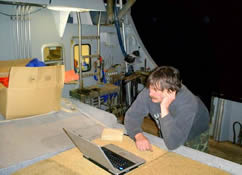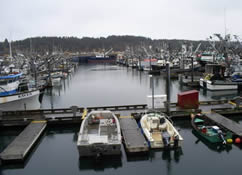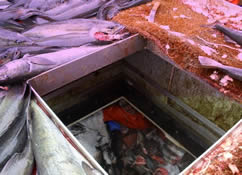
 |
 |
Crewmen's Association: Still Hauling Gear in Storm of RatzApril 20, 2007By Terry Haines - John Finley is an authentic Kodiak fisherman. 165 grizzled pounds of sea wisdom, salt water and stainless wire packed under a canvas hat. His boat, the Lindy II is a classic little Hansen double ender, a wooden work of art. He and the Lindy are usually out prowling the Gulf of Alaska or the Shelikof Strait furiously finding fish. He also finds time to share his knowledge of fish and politics in sharp and relevant written pieces. But his recent one reporting the abject surrender of the Bering Sea crab crews to the Big Bad Crab Ratz needs some major clarification. 
John and his readers should know that reports of the death of the Crewmen's Association are highly exaggerated. In fact the North Pacific Fisheries Management Council was presented with yet another proposal for crew inclusion in Crab Ratz at their March 2007 meeting by a CA representative, as they have every year since before the Ratz were earmarked into existence. Despite the fact that members attend these meetings at their own expense, the Crewmen's Association has been, and will continue to be, a strong and consistent advocate for working fishermen. As such the association's stance has always been to oppose privatization as a management tool because that is the position of the vast majority of the membership and since "Status Quo" has always remained an official (if not likely) option. However, you can oppose a tidal wave all you want; if you don't move your feet at the same time your socks are gonna get wet. Therefore the CA has always striven to engage the process in order to come up with viable solutions to the obvious problems posed by privatization for working fishermen and their communities.  To this end the CA is refining alternatives that would create a pool of quota that could not be owned, but would be harvested for the benefit of working fishermen and their communities. A case in point is the recent proposal written and submitted to the Council on behalf of the CA by Shawn Dochtermann. Here is a slice of it: Brief Statement of Proposal: 1. Reallocation of a percentage of Individual Fish Quota (IFQs) harvest privilege shares of "CR Crab" Bering Sea/Aleutian Islands king crab, opilio, and tanner crab fisheries - to active crab crewmembers; and 2. Provision for a single Crewmember's Cooperative for all "CR Crab".  3. Retain Open Market for All Crewmember Shares. Objectives of the Proposal (What is the Problem?): The problem is an inequitable distribution of CR Crab fishing privileges that resulted in excessive shares being assigned to vessel owners, and granted them inordinate control over fishermen on decks and in the wheelhouses, who are engaged in active fish harvesting. This was an unbalanced, direct and deliberate distribution of the opportunity to fish to a discrete user group or set of individuals that excluded long-term participants (boots-on-deck fishermen) without any justification in terms of the objectives of the Crab Rationalization FMP. This failed to preserve the status quo of economic distributions in the crab fisheries, ignored the dependence of present participants (crew) and coastal communities, and failed to fully consider the social and economic consequences (harms) of the scheme (rationalization). 1.Correct Inequitable Distribution of Harvester Shares under CR Crab FMP; and Restore Historical Crewmembers Compensation Levels. Skipper shares of 3%, combined with a complete failure to recognize deckhands as members of a vessel crew (by allocating 0% to them), fall drastically short of the historical earnings of crewmembers who actually harvest crab. A germane legal argument is that an inequitable 'takings' occurred as vessel owners confiscated upwards of 70% of ex-vessel fish ticket earnings as quota rents once the CR Crab FMP went into effect. Reallocation of crab quotas would provide the crewmen with fair and equitable quotas with which they, as small businesses that were needlessly harmed (even foreclosed) by inequitable allocations under Crab Rationalization to date, can retain future employment opportunities in these crab fisheries. 2. Crewmember Representation in Binding Arbitration & Price Negotiation. Add crewmember representatives to the binding arbitration tables to protect the financial interests of the skippers and crewmembers. 3. Assure Experienced Crews are Available and Rewarded in CR Crab Fisheries. Assure crewmember jobs in the future have earnings that are commensurate to their personal investments and the dangers of participation in CR Crab fisheries. Needs and Justifications for Council Action (Why can't the problem be solved through other channels?): The drastic reduction of jobs and pay with the massive consolidation of the rationalized crab fisheries forces this issue to be dealt with forthwith. There was no provision for crewmen to actually receive allocated quota initially in BS/AI crab rationalization, which violates: Section 600.325 National Standard #4 Allocations. Conservation and management measures shall not discriminate between residents of different states. If it becomes necessary to allocate or assign fishing privileges among various U.S. fishermen, such allocations shall be: (1) Fair and equitable to all such fishermen. (2) Reasonably calculated to promote conservation. (3) Carried out in such a manner that no particular individual, corporation, or other entity acquires an excessive share of such privileges. Discussion: In determining the allocations under CR Crab regime(s), the privileges were not rationally connected to the achievement of Optimum Yield - especially considering that it is through the crewmembers earnings that maximum net economic benefits flow widely to communities. The motives for making particular allocations were not justified in terms of objectives - i.e. to increase safety and reduce overcapacity - and disadvantaged crewmembers as individuals and a user group, without cause. Nor did the FMP properly contain income shifts from crewmembers to rent-seeking owners, nor deter acquisition of excessive shares. This resulted in obvious inequities that need to be corrected, not the least of which are up to 70% quota lease rents. There are two ways to correct this: 1) Council action to correct the inequities and re-establish crewmembers quota share rights; or 2) Judicial Review - i.e. a lawsuit. This proposal gives the Council the opportunity to correct program flaws and avoid such litigation. Foreseeable Impacts of the Proposal (Who wins, who loses?): Who Wins: By having quota rights Crewmembers (deckhands, engineers and skippers) gain ability for substantial employment opportunities and are more likely to achieve fair earnings. This enhances the interests of new entrants, as well. Crew will benefit from increased bargaining power for ex vessel compensation with both cooperatives and processors. Fishery dependent communities will benefit from increased (restored) crew incomes. Federal and state taxes will likely be higher, in total, as crewmembers invariably pay taxes whereas corporations shelter them. Are there alternative solutions? If so, what are they? And why do you consider your proposal the best way of solving the problem?: Yes, an alternative would be to overturn crab rationalization and return to Open Access with a 100 pot limit for king crab and 250 for opilio. This is the option that would best have modified Status Quo, which when coupled with buyback would have helped maintain crew jobs and avoid excessive consolidation onto fewer boats. Reallocation to fair and equitable historical participation levels through Council action is far better than facing inevitable and costly litigation. Additional Notes: Inherent in this proposal is a request that the Council begin a Discussion Paper and provide data for the allocation of the historical crewmembers' share of Bering Sea/Aleutian Islands "CR Crab" IFQs to be assigned to a Crewmembers Cooperative. This proposal would be linked to a "Buy Back My Back" program that would provide skippers and crew forced out of the fishery by rationalization a one time exit fee. It has been deemed reasonable to buy out pieces of steel made unnecessary by rationalization. Surely the human beings with families to feed deserve the same consideration. For boat owners who see this as cutting into their share, look at it this way: 1. Consolidation, in the form of a selloff of DAPs, will occur in any Ratz program. For those selling out to retire ashore, it's still a windfall, even minus the skipper/crew quota. 2. But for those continuing to fish after privatization, the consolidated skipper/crew quota will be linked to your boat along with your crew. For boat owners with working boats this will amount to having far more quota linked to your boat than before, for the low price of a bargain basement lease rate. 3. The skipper/crew quota would have no buyer linkage, allowing the vessel's master to find the highest ex-vessel price. A mirror program is being developed for Gulf Ratz. Many details need to be hammered out, and hopefully new Council members Fields and Steward can be convinced to help with the hammering. Maybe rationalization can work, for not just for fish and corporations, but also for fishermen and their communities. At any rate rest assured: the Crewmen's Association will never quit. As Caesar said, "For us it is fight or die. Pompeii's men have other options." For questions and to be included in detail hammering send me an e-mail. Terry Haines is a Kodiak deckhand and representative for Fish Heads, an advocacy group dedicated to preserving the vitality of Alaska's fishing communities. Contact Terry Haines © AlaskaReport News |
|